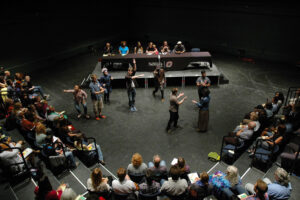By Sarah Stockholm
 This summer at the Pedagogy & Theatre of the Oppressed Conference (PTO) conference in Omaha, NE, I was overjoyed to participate in a collective conversation that, in the tradition of these pedagogies, asked a lot of questions. Where have we been? Where are we? Where are we going? I began what became 10 intense conference days of questions and reflections in the pre-conference workshop on Legislative Theatre with Barbara Santos and José Soeiro.
This summer at the Pedagogy & Theatre of the Oppressed Conference (PTO) conference in Omaha, NE, I was overjoyed to participate in a collective conversation that, in the tradition of these pedagogies, asked a lot of questions. Where have we been? Where are we? Where are we going? I began what became 10 intense conference days of questions and reflections in the pre-conference workshop on Legislative Theatre with Barbara Santos and José Soeiro.
Barbara worked for many years with Augusto Boal at CTO-Rio and was involved with the first experiments of Legislative Theatre. José utilized Legislative Theatre while he served in Portual’s parliament and continues to use it within Portuguese social movements. Their successful experiments with this branch of Theatre of the Oppressed guided us through theoretical dialogue towards enacting a mock session of Legislative Theatre for the opening night of PTO.
I have to say this workshop was the main reason I committed to a cross-country journey to attend the conference. As a Joker, I had felt limited in my capacity to create tangible social change. I heard myself excitedly explaining to friends that Theatre of the Oppressed is used to transform society. But, my community organizer instincts knew that the radical transformation I believed in could not be achieved only with individual solutions in isolated workshops and performances. I entered the workshop with the question of how to locate my practice more solidly in the streets in a grassroots movement for collective liberation.
José and Barbara offered a model of praxis that looked like a modified SWOT analysis (a common organizer tool) tailored to Legislative Theatre. As an organizer this made sense to me. There were four essential questions. The first two helped us understand the problem and seek solutions.
1. What law do we need?
2. How do we make sure it is effective?
The next two moved us into a process of organizing to gain the grassroots capacity to enact a solution that balances power between oppressor/oppressed or legislator/citizen, corporation/community, etc.
1. How do we get legislative power?
2. How do we build the balance of forces?
This was the first time I felt like Theatre of the Oppressed was helping me locate institutional power with the support to challenge it. I saw the capacity for Theatre of the Oppressed to live in grassroots social movements as a tool beyond exploring the dynamic between oppressor and oppressed. Legislative Theatre felt like the missing link towards concrete social transformation.
Within the workshop we created two plays, both located within the educational system. One focused on transforming institutional racism and the other, addressing the rights of learners with disabilities. On the opening night of the conference we began a mock session of Legislative Theatre. Spect-actors chose one play to Forum from which we gained insights into the issues and possible solutions. Then, spect-actors wrote, proposed and voted on legislation to create lasting social change. It was an energizing, participatory way to begin the conference.
In a real scenario, José explained, we would take the spect-actor proposals and end the session. Then, in a more typical movement based campaign approach, we would continue more research to see what proposals were actually possible. At the next session, these findings would be presented and using theatre/dialogue, we would refine a proposal. This cycle would continue until we generated a final proposal, from which a whole new process began: strategizing and organizing to turn the proposal into a real law. He added that perhaps we might discover our proposed law is already written, but not utilized or being violated. This would turn the direction of our organizing towards raising awareness and holding officials accountable to the law.
This process of Legislative Theatre made sense to me and modeled a way to merge my skills as a Joker with my skills and passion for movement building. Legislative Theatre supports the collective need for concrete and continuous social action, the need for organizing. Meanwhile other branches of TO support the needs of movements to recognize and communicate one’s own oppression and location in a complex political system. Without a doubt, Theatre of the Oppressed is transformative in deep personal ways, can build community, understanding across differences and demonstrates we all have the choice to act and create.
Everyday I wake up and see the world transform.The problem is that the most powerful exert tremendous and long-lasting transformations that we struggle against to balance power and create a more liberatory, just and joyous world. Surely, others reeling from post-election blues this month understand the magnitude of work we face. Because of this, I take these words of Augusto Boal’s quite seriously, “We are all actors: being a citizen is not living in society, it is changing it.” I hope that whatever your relationship to Theatre of the Oppressed is, you take his words seriously, too.
To change everything, we need everyone.
Sarah Stockholm is an Artist-Apprentice with the Mandala Center for Change, a cultural worker and community organizer in Olympia, WA. Follow her @lessonsfromhere.
(Picture from the opening session of the Pedagogy and Theatre of the Oppressed Conference, see more of their pictures on their website.)

